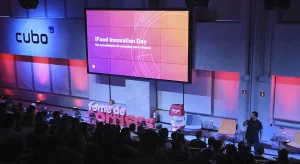The story of a startup generally begins with the execution of an innovative idea. But what happens when that garage idea works out and becomes the pillar of a giant, long-lasting company? Will that initial spirit of revolutionizing the market and the status quo remain alive?
As companies grow, they risk becoming less innovative. But this is not a dogma. At iFood, we believe that it is possible to scale without losing our appetite for disruption.
Part of my job is to challenge my teams to explore new possibilities and question barriers to going beyond our limits. Should we start using drones to make deliveries? Or go into perfumery delivery?
One of the central strategies of business It’s about challenging the many things we take for granted – or that we think we can’t change, or that seem clearly impossible. Here at iFood, we know that the future will not be like the present.
To continue to survive and thrive, we continually develop innovation methodologies that work and that help us drive the changes that all societies will need to make if they are to live well in the 21st century.
Firstly, it is essential to teach our professionals to innovate, as well as making it clear that this means taking risks and embracing uncertainty. Our message is that no one will be punished for failure because there is always gain in daring – or a lesson to be learned. I would even say that this is an investment against future mistakes. After all, failure brings a lot of experience.
In today's complex business environment where change is constant, speed of adjustment and execution is far more important than perfect execution. To build a great company culture, failure must not be seen as a barrier to success, but rather as a path in which an organization learns and becomes remarkable.
At iFood, we maintain the spirit of disruptive innovation to fail fast or scale quickly. To put this into practice, we adopted the Jet Ski methodology, which is based on five pillars – focus on strategic ideas, taste for risk, no fear of making mistakes, short cycles and multidisciplinary teams -, which I will explain in more detail in the next article.
In short, we collect ideas from across the company, and a senior executive committee chooses the most important ones. From there, a small team called Jet Ski, typically made up of 4 to 8 people, is made up of professionals with the necessary skills, who receive support from IT, design, product, data science and market intelligence services. This team works on the idea for a period of 60 to 120 days, delivering regular performance reports.
Jet Skis work closely with senior iFood executives, selected to oversee each project based on their expertise and roles within the company. When the initial pilot promises good results, it is expanded and implemented in thousands of Brazilian cities.
Although the main objective of this methodology is to test new ideas and approaches and find out if they will work in the real world, it is important to note that it also trains FoodLovers (as we call our employees) to be smart, agile entrepreneurs and able to take risks in the process.
There are many psychological experiments showing that people behave in accordance with other people around them. Humans are designed to behave and present themselves as others do. At iFood, we take our teams out of norms and routines so that people realize they can do much, much more.
We encourage our talent to take real risks, be ambidextrous, learn from their mistakes and never settle for less. We have big goals and a tested, validated innovation methodology that other companies can also adopt to be “the next iFood” in their sector.
At iFood, thinking big isn't about having an idea and throwing it into other people's laps. Not even giving a “thumbs up” on your colleagues’ projects. Here, people think and do, they are the ones who pilot their projects and coordinate with all areas to make it happen.
We want people to have ideas, but what's even more important is to get them off paper, otherwise innovation won't happen. Maintaining this entrepreneurial – and intrapreneurial – spirit is our formula for continuing to innovate and go further and further.
Data analysis: how to innovate in decision-making in your company?
download our eBook free About the subject


